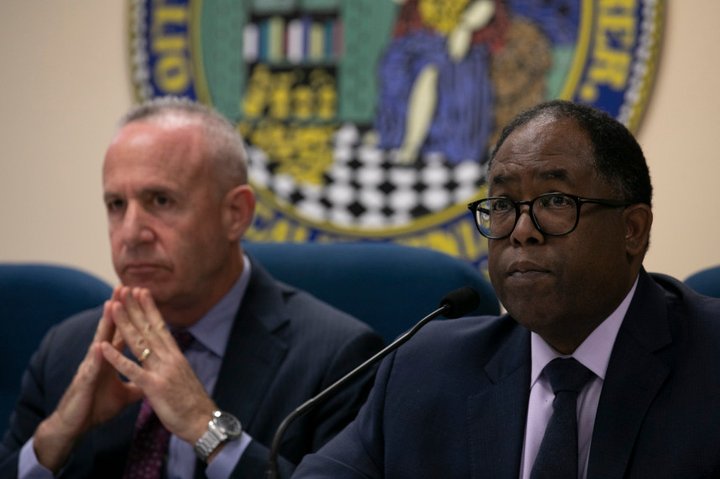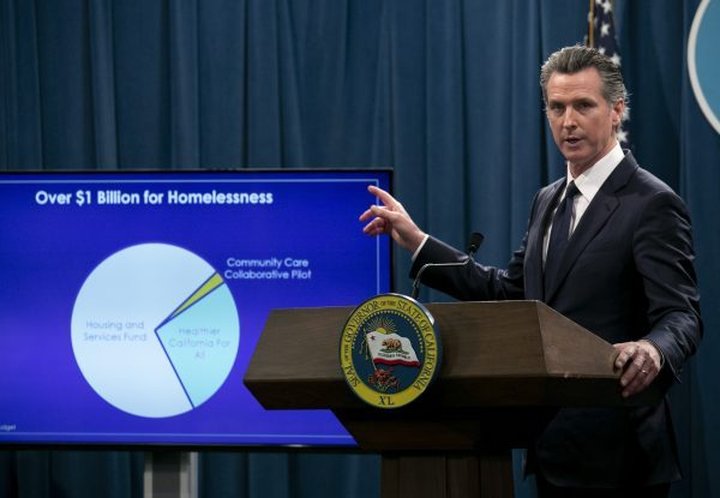Matt Levin and Jackie Botts, CALmatters / Monday, Jan. 13, 2020 @ 1:33 p.m.
Cities Should Act on Homelessness or Face Lawsuits, Newsom Task Force Says

Sacramento Mayor Darrell Steinberg, left, and Los Angeles County Supervisor Mark Ridley-Thomas, who are leading Newsom's task force, have been pushing for some legal leverage to force action on homelessness. Photo by Anne Wernikoff for CalMatters
###
Declaring that moral persuasion and economic incentives aren’t working to bring people in from the sidewalks, Gov. Gavin Newsom’s task force on homelessness called Monday for a “legally enforceable mandate” that would force municipalities and the state to house the growing number of homeless Californians.
The proposal, which came as Newsom kicked off a weeklong tour of the state aimed at drawing attention to the homelessness crisis, urged the Legislature to put a measure on the November ballot that would force California cities and counties to take steps to provide housing for the more than 150,000 Californians who lack it, or face legal action.
The proposal stops short of a New York-style ‘right to shelter.’ But it would elevate litigation as a tool to accomplish what compassion and money haven’t been able to do.
Such a measure would require a two-thirds vote of both legislative houses to be brought to voters. California law does not now penalize the state or local governments for failing to reduce their homeless populations, or to make housing sufficiently available to people without it.
But Los Angeles County Supervisor Mark Ridley-Thomas and Sacramento Mayor Darrell Steinberg, who co-chair the governor’s 13-member Council of Regional Homeless Advisors, have been advocating some sort of enforceable “right” to sleep indoors since the U.S. Court of Appeals for the Ninth Circuit struck down laws against homeless camping. That ruling, which the U.S. Supreme Court let stand just last month, dramatically limited cities’ enforcement options, finding it to be cruel and unusual punishment to prosecute people for sleeping on the street if sufficient shelter isn’t available.
“California mandates free public education for all of its children and subsidized health insurance for its low-income residents. It requires its subdivisions to provide services to people with developmental disabilities and foster children,” the commission wrote in a letter signed by both elected officials.
“Yet everything that state, county and city governments do to alleviate this crisis is voluntary. There is no mandate to ensure people can live indoors, no legal accountability for failing to do so, no enforceable housing production standard and no requirement to consolidate and coordinate funding streams across jurisdictions. The results speak for themselves.”
The council’s recommendation stops short of Steinberg’s and Ridley-Thomas’ original call for a “right to shelter,” which would have not only have required cities to provide immediate beds, but also obligated people experiencing homelessness to come inside. But it adds momentum to the strategy of elevating litigation as a tool to accomplish what compassion and money haven’t been able to do.
Newsom, visiting a homelessness program in Nevada County, said Monday he “would lean in the direction” of speedily deploying a legal “obligation” to supply sufficient services and housing, adding that “a number of cities and counties” have volunteered to do demonstration projects over the next several months, “not the next few years.”
“I broadly have been encouraging this debate about obligations,” said Newsom, adding that “there’s a distinction between rights and obligations, and I do believe leaning into obligations is incredibly important.”
The governor didn’t elaborate further whether there is a legal distinction between rights and obligations, but seconded the task force’s point that many of the state’s responsibilities stem from legal mandates: “We do it in almost every other respect,” Newsom said. “On this issue we don’t and I think that’s missing. The question is how do you do it…. This is not black and white. This is tough stuff.”
The task force’s proposal would let a “designated public official” sue the government for not doing enough to offer emergency and permanent housing to the homeless. A judge could then intervene to force a city to approve an emergency shelter, for example, or redirect budget funds to homelessness services.
The proposal lacks specifics on how taxpayers would pay for such a mandate. The letter released by the 13-member task force, which included local elected officials from large and small cities, states that “more state resources will undoubtedly be required” but includes no estimate.
State and local governments in recent years have poured billions into combating homelessness, only to watch the problem worsen as ever-rising rents drive Californians to the streets faster than they can be re-housed. On Friday, for the second straight year, Newsom proposed more than $1 billion in new state funds to fight homelessness, calling it “the issue that defines our times” in California. But the state’s “point-in-time” homeless count jumped 17% between 2018 and last year.
Putting the onus on government to provide housing.
Steinberg and Ridley-Thomas floated the idea of a statewide “right to shelter” law last year. Spurred by decades-old litigation, New York state has a “right to shelter” policy that makes its state and local governments legally liable for having emergency shelter beds available for every unhoused person.
While many credit “right to shelter” for New York’s success in reducing the number of people sleeping on the streets, Newsom and advocates for the homeless have balked at the idea. Some advocates fear it would divert finite funding from permanent supportive housing, which experts say is a more long-term, albeit expensive solution; others worry about cost and potential civil liberties violations that might arise from requiring a homeless person to accept shelter if it’s available.
Advocates for the homeless said more specifics are needed, but applauded the task force’s recommendations as a philosophical pushback, at least, against efforts to criminalize living on the streets.
“The reason why right to shelter is a mistake is because it diverts resources from the solution, which is housing, not shelter,” said Sharon Rapport, California policy director for the Corporation for Supportive Housing and a member of the task force.
Under the policy proposed by the task force, a local government would be required to develop a plan to house the vast majority of its homeless people within “an aggressive but reasonable period of time.” “Reasonable” is not defined in the letter.
Advocates for the homeless said more specifics are needed, but applauded the task force’s recommendations as a philosophical pushback, at least, against efforts to criminalize living on the streets.
“Any kind of policies that are promoting locking up people or warehousing people or punishing people for being homeless, the council is saying those policies have been very ineffective in the past,” said Rapport.
The city of Bakersfield recently proposed ramping up enforcement of low-level drug offenses to get people off the streets there, and advocates have expressed concern that the Trump administration’s threats to do something about homelessness in California may involve heavier use of law enforcement.
A homelessness czar, but little on conservatorships
The task force also called for a single point-person on homelessness, a Newsom campaign promise that devolved in his first year into confusion over who, at any given point, was his “homelessness czar.”

Gov. Gavin Newsom, answering questions on his 2020-21 state budget on January 10, 2020, told reporters: ““You want to know who’s the homeless czar? I’m the homeless czar in the state of California.” Photo by Anne Wernikoff for CalMatters
Various administration members, including Steinberg and Ridley Thomas, Secretary of Health and Human Services Mark Ghaly, and advisor Jason Elliott, have filled the role -- so many that last week, Newsom headed off press questions by declaring tartly, “You want to know who’s the homeless czar? I’m the homeless czar in the state of California.”
But the issue of who is actually overseeing the state’s disparate homelessness initiatives -- across multiple bureaucracies from prisons to healthcare -- is still pressing, at least according to the homelessness task force. One of their key recommendations would “create a single point of authority of homelessness in state government,” suggesting a high-level official that reports directly to Newsom. Another calls for a comprehensive accounting of existing funding for homelessness, housing, mental health and substance abuse treatment.
Still other recommendations have already been incorporated into Newsom’s proposed homelessness budget, including a “flexible fund” that service providers can tap for uses from emergency rental assistance to building shelters. The task force also proposed revamping the state’s health insurance program to draw down more federal dollars for homelessness-related services, a key pillar of the strategy Newsom unveiled last week. Doing so would require a waiver from the federal government.
More controversial proposals included an executive order expanding the state’s new rent-gouging law to cover more households and legislation exempting from environmental review any new housing project for people at risk of homelessness.
California has strict laws that make it difficult to detain mentally ill people against their will for a prolonged period of time. Families of homeless loved ones struggling with schizophrenia or other disorders often blame the Lanterman-Petris-Short Act, a late 1960’s law intended to curb the overuse of asylums, for precluding necessary care. New York’s commitment laws are less stringent.
While Newsom talked vaguely of reforming the law last week, such reforms are conspicuously absent from the task force’s report.
###
CALmatters.org is a nonprofit, nonpartisan media venture explaining California policies and politics.
CLICK TO MANAGE